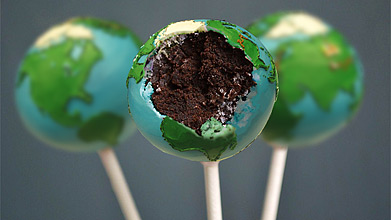This year I will have traveled one million miles on my preferred airline. That’s the equivalent of two trips to the moon and back. It also amounts to about 2,000 hours strapped to a plane seat and at least 1,000 more sitting around in airports.
Since so much of my life has been invested in travel, much of it international, I’ve observed something about those of us who possess the power, privilege, and money to travel overseas; sometimes we end up treating the world like a product to be consumed. Here’s what I mean:
Right now, during high season, I can find flights from San Francisco to Manila for only $723. As reasonable as that may seem, the half of the world living on less than $2.50 per day could not get their hands on that much money at one time. We forget that the majority of people on this planet will never have the resources to board a plane leaving their country. It’s not because they don’t have anything to offer those outside their borders, or that they wouldn’t benefit from such a trip. It’s because they lack access to resources.
I’ve had the privilege of spending time with people who live in desperate poverty and I can assure you that many of them possess a kind of experiential knowledge which could benefit the rest of the world. We who are the rich and middle class of this world travel internationally, not because we are the best global citizens or because we have the most to contribute to the world. We travel because we can afford to. And if we can afford to travel, we can afford to help others who might benefit from travel. Consider using money or miles to help those for whom travel would be extremely difficult.
I find within myself and others who have enough wealth to travel an air of self-importance. It is as if we believe we are God’s gift to the world—or perhaps that the world is God’s gift to us, available for our consumption. There are all sorts of tours for the middle class and rich: river tours, architectural tours, Holy Land tours, culinary tours, sex tours, even poverty tours. These are designed for private enrichment or pleasure. We’ve earned this luxury; we deserve this luxury. But when we use a common good (like the world and her people) for a private benefit, we run the risk of inflating our egos and devaluing the world. Collecting exotic experiences, listing all the countries we’ve been to on social media, populating our dust-covered shelves with trinkets from other places—these are activities which can objectify God’s creation.
It’s not that God doesn’t mean for us to enjoy this beautiful planet and her people, it’s that we must take care not to turn the world into our private, experiential playground. The world and her people are not items on someone’s personal bucket list; we are all part of a global, interdependent community. When we do travel, slow down enough to build just one local friendship, one that can endure when we return home.
It’s not that God doesn’t mean for us to enjoy this beautiful planet and her people, it’s that we must take care not to turn the world into our private, experiential playground. The world and her people are not items on someone’s personal bucket list; we are all part of a global, interdependent community.
Beyond the hazards to our ego, there are environmental hazards to our travel. Every individual traveling by air contributes about 10 ounces of CO2 to the atmosphere for each mile traveled. That adds up when you’ve got a planeload of people traveling on that cheap flight from San Francisco to Manila. I am personally responsible for dumping over half a million pounds of CO2 into the atmosphere as a result of my air travel.
And it’s not just the environmental cost of air travel. Travel itself tends to be harsh on the environment. When we travel we are distanced from the effects of our behavior. The impact of our misdeeds or faux pas remain behind while we go home. Generally speaking, I tend to consume more when I travel. I eat out more, I drink more bottled water, and I don’t carry back things that could be re-used later. We tend to justify a little extravagance to treat ourselves or to compensate for the strain of travel. And even if we are intentional about not mistreating the environment, the nature of travel is that we do. We may only stay in a hotel one night, but the sheets need to be washed anyway. In our lust to see the world we consume a bit of the planet in the process.
I know an internationally renowned monk whose religious order—because of the environmental cost of travel—only allows him one international trip a year. Every year he must say “no” to many prestigious and beneficial invitations in order to remain faithful to the environmental limitations placed upon him by his order. Can we keep this example in mind and put reasonable boundaries on our globetrotting?
International travel is part of my job. Many of us travel with the best of intentions and a desire to help others. But let’s not fool ourselves. We travel because we have the power, privilege, and wealth, not because we are the best qualified. Let’s consider treading more lightly on the planet. It’s okay to say no to some opportunities and to enjoy the beauty and wonder of the places nearby. When we do experience the luxury of travel, let’s keep our inflated egos in check, bringing others who may not have the privilege of travel, learning from those who are least like us, and living simply and gently in our common home.

